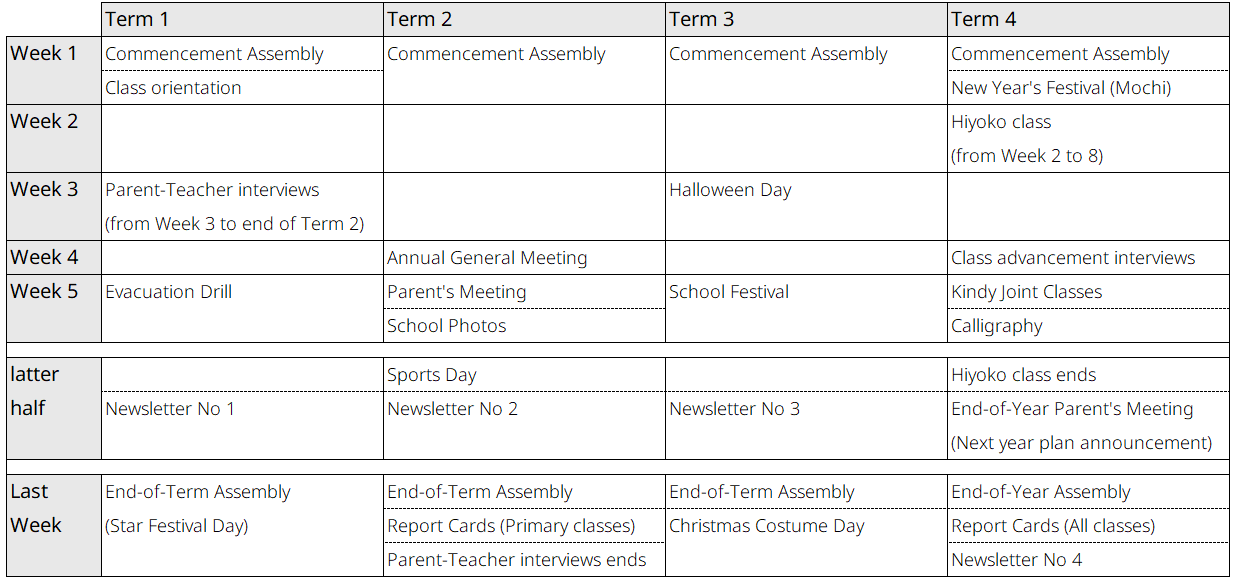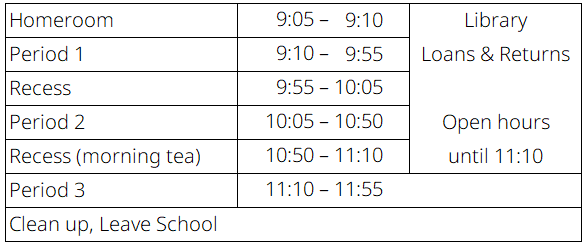About Us
Location
The school is borrowing the premises of Killarney Heights High School.
Address: Starkey Street, Killarney Heights
School Days and Terms
The school is open on Saturdays, for 4 terms, aligning to the NSW public school calendar, but the school’s first term begins from term 2 of NSW public schools. It is in line with the Japanese schools calendar. The school is open weekly, more than 36 times a year.
Yearly Plan
This is our approximate yearly plan.

Timetable
The school is open on Saturdays, during NSW public school terms, for around 3 hours, from 9:05 am to 11:55 am.
Please come to school by 9:00 am.

Classes
Preschool Class
- Preschool Preparatory Class
Open only in Term 4 (Feb and Mar) for those who have enrolled for the Preschool Class from the following school year. - Preschool Class
- Kindy Class
For classes after Kindy onward, the school offers two separate courses: the Textbook Course and the Japanese Language Course.
Classes for each course are as follows:
Text Book Course
- Elementary Classes: Y1-Y6
- Secondary Classes: Y7, Y8
Japanese Language Course
- Elementary Classes
- Lower Grades
- Middle Grades
- Upper Grades
Notes
- Child's classroom allocation is based on the Japanese proficiency, age and the level of maturity of your child observed in the admission interview.
- The classes are called Year 1, 2 ... However, the classes and content children learn are not always the same as those in Japan.
- We are ready to set up other classes depending on the demand from the interested students and parents. Please feel free to contact us. We are willing to accept students who have given up, lost confidence in Japanese or who haven't gone well in other Saturday schools. We will find their strengths and weaknesses and help foster an improvement in their Japanese ability in a happy learning environment.
Student Quota per Class
The maximum quota per class, in principle, is 10 to 13 students. This is the number we believe our school’s intention “Slowly but surely” is achieved. However, it may vary depending on the years/grades, members of students in class or the atmosphere they create. The final decision will ultimately depend on the class teacher.
Where the number of applicants exceeds the maximum quota, they will be put on the waiting list until there is a vacancy.
Class Allocation / Grade Decision
After the admission interview, your child will be allocated in a class we think they can perform best. This is based on the child’s proficiency and the level of maturity observed in the interview. However, it is finalised after discussing with parents. This is because we think it is best that parents and the school work together for the child. We know it is a hard work to maintain and improve Japanese outside of Japan. We believe the cooperation between parents and the school is a must to succeed in children’s learning.
Learning Experience Outside of Classroom: School Assemblies and School Events
The school has at least 3 school assemblies/events in each term: a commencement assembly at the first day of a term, a term-ending assembly at the end of term and at the middle of the term we have a school event focused on seasonal fun activities based on the Japanese culture and society (eg. Sports Day or School Festival). The students can learn and experience something both Japanese and Australian in a relaxed and fun way. In the term-ending assembly, students make a class presentation based on what they have learned in class.
Teaching Staff
The school’s teachers are recruited and appointed under the guidelines of the Community Languages Schools Program (CLSP) of the NSW Department of Education. They are qualified, experienced and dedicated teachers who understand the school’s goal and teaching curriculum. They are registered within the CLSP and have various opportunities to improve their teaching skill in the in-services conducted by the Department and its associates. In our school, our teachers have a meeting at least once a term and in-service at least once a year under the management of the school committee and the school director. For the newly appointed teachers, the school offers in-services to understand and learn the school’s teaching strategies. Our teachers are conscientious, cooperative and hard workers to maintaining the quality and standard teaching of this school.
School Structure
The school is run as a non-profit, independent organisation under the Community Languages Schools Program (CLSP) of the NSW Department of Education. We will seek grants from the Department to support school management.
School Management
The school is run by the school management committee, which consists of 4-8 parent and teacher volunteers. They are the same parent as you (a parent), who kindly offer their time and goodwill to help out the school. Without their assistance and dedication, the school is not able to provide a safe and happy school environment for students. Under the management of the committee, all the parents are requested to help out the school. There are 3 kinds of assistance as below: 1. Regular assistance on roster (3 times a year). Duties include: setting up, classroom assistance, administration assistance, packing up). 2. Event assistance according to their child’s classroom (once a year). 3. School Festival assistance.
The school is eventful, so the committee welcomes any parent who offers their assistance when necessary. The school needs positive participation and involvement from parents as we aim our school’s motto “A school made up of the participation by all – students, teachers and parents.” We believe this will make the school a united and successful learning place for children. We expect every parent to share this motto as the school, same as other Saturday schools, is made of every PARENT’S wishes for children. To make the school a good place or not is all up to the parents. We sincerely request every parent to have this mindset.
Parent Roles
The school expects every parent’s assistance in any areas of school management. Any job itself is not difficult. We request parents to fill in the parent helper roster on the first day of each term. The learning motivation of every child at the school depends on parents’ interest/involvement in school activities. Their involvement will improve children’s proficiency and/or interest in learning. The school will initiate the direction of successful learning for your child, but we are only assistants for it. We recommend each family to discuss and set up goals for children’s learning first and then utilise the school to reach these goals. Without this kind of parents’ attitude, these goals cannot be achieved. We request each parent to show your interest/involvement in the school and child’s learning. This includes showing interest in asking/listening to children what has happened at school, participating in school events and activities, helping out with their homework and so on. We request your involvement in these many ways.